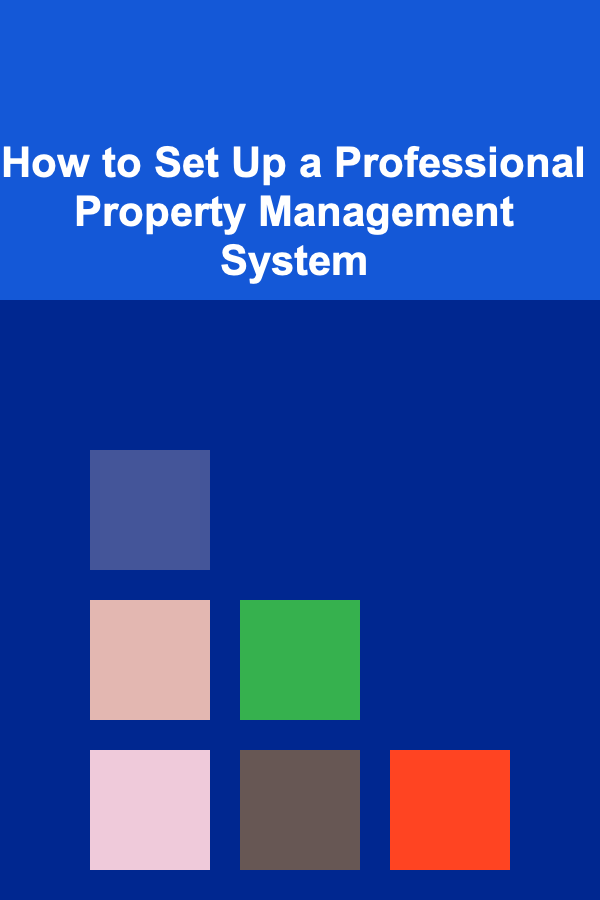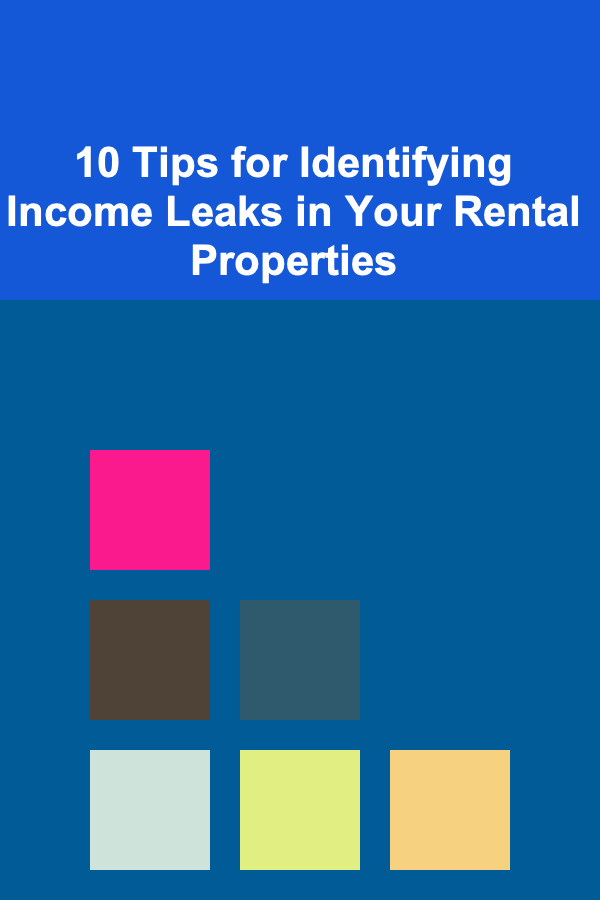
How to Set Up a Professional Property Management System
ebook include PDF & Audio bundle (Micro Guide)
$12.99$11.99
Limited Time Offer! Order within the next:

Setting up a professional property management system is essential for landlords, property owners, and property management firms. It ensures that operations run smoothly, tenants are happy, and the property remains well-maintained. Whether you're managing one rental property or hundreds, an organized system can save you time, reduce costs, improve tenant satisfaction, and increase your profitability.
In this comprehensive guide, we'll delve into the crucial steps to establish a professional property management system, covering everything from choosing the right tools and software to effective communication strategies and maintenance workflows.
Define Your Goals and Objectives
Before you dive into setting up your property management system, it's essential to understand your goals. A property management system isn't just about keeping track of rent payments; it's about creating a system that helps you meet your long-term business objectives. Here are some key goals to consider:
- Maximize profitability: Whether you are managing a single property or an entire portfolio, the main goal should be to ensure the property is profitable by reducing costs and increasing rental income.
- Minimize vacancies: Keeping tenants in place or minimizing the time a property sits vacant is a crucial part of property management.
- Maintain property value: Regular maintenance and keeping the property in good condition helps preserve its value and prevents costly repairs down the line.
- Enhance tenant satisfaction: Satisfied tenants are likely to renew their leases, refer others, and take better care of the property.
- Ensure legal compliance: Laws governing rental properties vary by location. Ensuring compliance with regulations is critical to avoiding legal issues and fines.
Understanding these goals will guide your decision-making when it comes to the tools, processes, and strategies you implement in your property management system.
Choose the Right Property Management Software
A modern property management system relies heavily on the use of software that helps automate and streamline key tasks. Choosing the right software is the first step toward building a professional system.
2.1 What to Look for in Property Management Software
When selecting software, consider the following factors:
- Ease of Use: The software should be user-friendly, with an intuitive interface that allows you to access and manage various property management tasks without requiring complex training.
- Cloud-Based Access: Cloud-based software ensures that you can access the system from anywhere, which is crucial for managing multiple properties or working remotely.
- Integrated Accounting Tools: A good property management system should integrate accounting tools for rent collection, budgeting, expense tracking, and financial reporting.
- Tenant and Lease Tracking: The software should have features that allow you to track tenant information, lease dates, payment history, and renewal reminders.
- Maintenance Request Management: A professional property management system should include a maintenance tracking feature where tenants can submit repair requests, and you can assign and monitor work orders.
- Communication Tools: The ability to communicate with tenants efficiently through built-in messaging features, email notifications, or a tenant portal is essential for smooth operations.
- Document Storage: The system should allow you to store and access important documents, such as lease agreements, maintenance records, and inspection reports.
Some popular property management software options include Buildium , AppFolio , TenantCloud , and Yardi. Take the time to test out a few options and select the one that aligns best with your needs.
2.2 Setting Up the Software
Once you've chosen your software, it's time to set it up. Here are some key steps:
- Enter Property Information: Start by entering basic details about your properties, including their location, size, type, and any unique features.
- Add Tenants: Input tenant contact information, rental history, and lease terms. This allows you to track who occupies each unit and when leases are set to expire.
- Configure Rent Payment Options: Set up the rent payment system so that tenants can pay online, automate reminders, and track late fees.
- Set Maintenance Procedures: Create workflows for handling maintenance requests. Define how requests are logged, who assigns them, and how progress is tracked.
- Create Templates: Set up standard templates for emails, letters, and notices such as late rent reminders, lease renewals, or inspection notices. These save time and ensure consistency in communication.
By setting up the software properly from the beginning, you'll create a robust framework that will grow with your property management business.
Build a Comprehensive Tenant Screening Process
Tenant screening is one of the most critical aspects of property management. The quality of your tenants directly impacts your property's profitability, security, and overall management workload. Establishing a professional tenant screening system ensures that you choose reliable tenants who will pay rent on time and take good care of the property.
3.1 Key Elements of Tenant Screening
- Background Check: Conduct background checks to review any past criminal activity or evictions. This helps you avoid tenants who could be problematic.
- Credit Check: A credit check provides insight into a potential tenant's financial responsibility. Tenants with a low credit score may be more likely to miss rent payments.
- Rental History: Verify past rental references to assess whether the tenant paid rent on time, followed the lease terms, and left the property in good condition.
- Employment Verification: Ensure the tenant has stable income by verifying their employment and monthly earnings to determine their ability to pay rent.
- Personal References: Ask for personal references who can vouch for the tenant's character and reliability.
3.2 Using Technology for Screening
Incorporating technology into your tenant screening process can streamline the process and reduce errors. Many property management software solutions offer integrated tenant screening tools that automate background checks, credit reports, and rental history verification. Additionally, you can use services like TransUnion SmartMove or RentSpree to perform tenant screenings directly from your application forms.
3.3 Creating a Fair Screening Policy
It's important to establish clear and consistent tenant screening criteria to avoid discrimination claims. Your criteria should be based on objective factors such as credit score, income, rental history, and criminal background. Make sure you comply with all local, state, and federal laws related to tenant screening, including fair housing laws.
Automate Rent Collection and Payment Processing
Automating rent collection is one of the most time-saving aspects of a property management system. Instead of chasing tenants for payments or handling cash, you can set up a seamless and efficient payment system that ensures timely rent collection and minimizes late payments.
4.1 Online Payment Portals
Most property management software includes online payment portals where tenants can pay their rent electronically. Setting up an online payment system provides the following benefits:
- Convenience for Tenants: Tenants can pay rent from anywhere at any time, which increases the likelihood of on-time payments.
- Automated Reminders: Automated rent reminders can be sent to tenants before rent is due, reducing the chances of missed payments.
- Instant Processing: Payments are processed immediately, reducing the delay in tracking payments and improving cash flow.
- Payment History Tracking: The software keeps a record of all payments, making it easy for you to track payment history and issue receipts.
Popular payment providers like PayPal , Stripe , and Venmo can also integrate with property management software for quick and secure payment processing.
4.2 Late Payment Policies
Ensure that your system has a clear policy for handling late payments. This should include:
- Late Fees: Set up automatic late fees that are applied if rent is not paid on time. Clearly outline your late fee structure in the lease agreement.
- Payment Plans: Consider offering payment plans for tenants who have difficulty paying rent in full. Your property management system should be able to accommodate payment plan tracking.
- Eviction Notices: If tenants consistently fail to pay rent, your system should allow you to easily send eviction notices and track the legal steps involved.
By automating these processes, you can reduce the time spent managing rent collection and focus on other aspects of property management.
Establish Efficient Maintenance Management
A professional property management system should have a clear and streamlined process for handling maintenance requests. Regular maintenance and prompt repairs ensure tenant satisfaction, reduce the risk of costly emergency repairs, and extend the lifespan of your property.
5.1 Maintenance Request Portal
Create a maintenance request portal within your property management system where tenants can submit requests online. This portal should allow tenants to:
- Submit a description of the issue
- Attach photos or videos of the problem
- Indicate the urgency of the repair
5.2 Work Order Management
Once a maintenance request is submitted, the property management system should automatically create a work order. The system should track:
- Assigned Vendor: The system should allow you to assign contractors, handymen, or maintenance staff to the job.
- Completion Date: The system should allow you to set deadlines for repairs.
- Costs: Track the costs associated with each maintenance request, whether they are labor costs or material costs.
5.3 Preventive Maintenance
A professional property management system should also track preventive maintenance tasks. These include regular inspections, appliance servicing, HVAC filter replacements, and pest control. Creating a preventive maintenance schedule helps you avoid expensive repairs and ensures your property remains in good condition.
Communication and Tenant Engagement
Effective communication with tenants is critical to maintaining a positive relationship and ensuring the smooth operation of your property. A professional property management system should include tools for managing communication and engaging tenants.
6.1 Communication Channels
Make sure your property management software allows for seamless communication between you and your tenants. This includes:
- Emails and Messages: Automated and manual email templates for notifications, such as rent reminders, lease renewals, and maintenance updates.
- Tenant Portal: A portal where tenants can submit requests, track their payments, view announcements, and access important documents.
- Mobile App: A mobile app allows tenants to manage their account, pay rent, and request maintenance directly from their smartphones.
6.2 Resolving Issues and Conflicts
A good property management system should also help resolve issues and conflicts efficiently. By keeping track of all communications and actions taken, you can ensure that tenant concerns are addressed promptly and professionally.
Legal and Compliance Considerations
Finally, a professional property management system should help you stay compliant with local, state, and federal laws. This includes:
- Fair Housing Laws: Ensure that all tenant screening, leasing practices, and maintenance requests comply with fair housing laws.
- Lease Agreement Management: Store and manage lease agreements, renewals, and terminations electronically to ensure proper documentation.
- Eviction Processes: Track eviction proceedings and ensure compliance with local eviction laws.
By staying on top of legal and regulatory requirements, you protect yourself and your tenants and ensure the long-term success of your property management system.
Conclusion
Setting up a professional property management system involves much more than just collecting rent and fixing broken appliances. It requires a holistic approach that encompasses everything from tenant screening to maintenance management and communication. By leveraging technology, automating processes, and creating clear workflows, you can run your property management operations more efficiently, reduce costs, and improve tenant satisfaction.
A professional property management system is an investment in your business, ensuring that your properties remain profitable, your tenants are happy, and your long-term goals are met.
Reading More From Our Other Websites
- [Home Cleaning 101] How to Clean Your Home Efficiently in Under an Hour
- [Organization Tip 101] How to Set Up a Dedicated Composting Area
- [Simple Life Tip 101] Best Minimalist Parenting Tips for Raising Independent Kids
- [Home Holiday Decoration 101] How to Use Handmade Holiday Decorations to Add Charm to Your Home
- [Home Family Activity 101] How to Make DIY Home Spa Activities for Family Relaxation
- [Home Holiday Decoration 101] How to Transform Your Home with Holiday Wreaths and Garlands
- [Tie-Dyeing Tip 101] Colorful Cohesion: How to Host a Successful Group Tie-Dye Party
- [Home Cleaning 101] How to Remove Stubborn Stains from Carpets and Rugs
- [Reading Habit Tip 101] Best Ways to Synchronize Your Reading Habit with a Regular Physical Exercise Schedule
- [Home Party Planning 101] How to Organize the Best Christmas Party Games for Family Fun

How to Handle Pet Shedding and Keep Your Home Clean
Read More
How to Organize Your Cleaning Routine to Save Time
Read More
How to Prepare Your Home for a Last-Minute Showing
Read More
Finding New Artists in the Dark Pop Genre: A Deep Dive
Read More
Demystifying Form 720: Excise Tax Return for Beverage Importers
Read More
10 Tips for Identifying Income Leaks in Your Rental Properties
Read MoreOther Products

How to Handle Pet Shedding and Keep Your Home Clean
Read More
How to Organize Your Cleaning Routine to Save Time
Read More
How to Prepare Your Home for a Last-Minute Showing
Read More
Finding New Artists in the Dark Pop Genre: A Deep Dive
Read More
Demystifying Form 720: Excise Tax Return for Beverage Importers
Read More